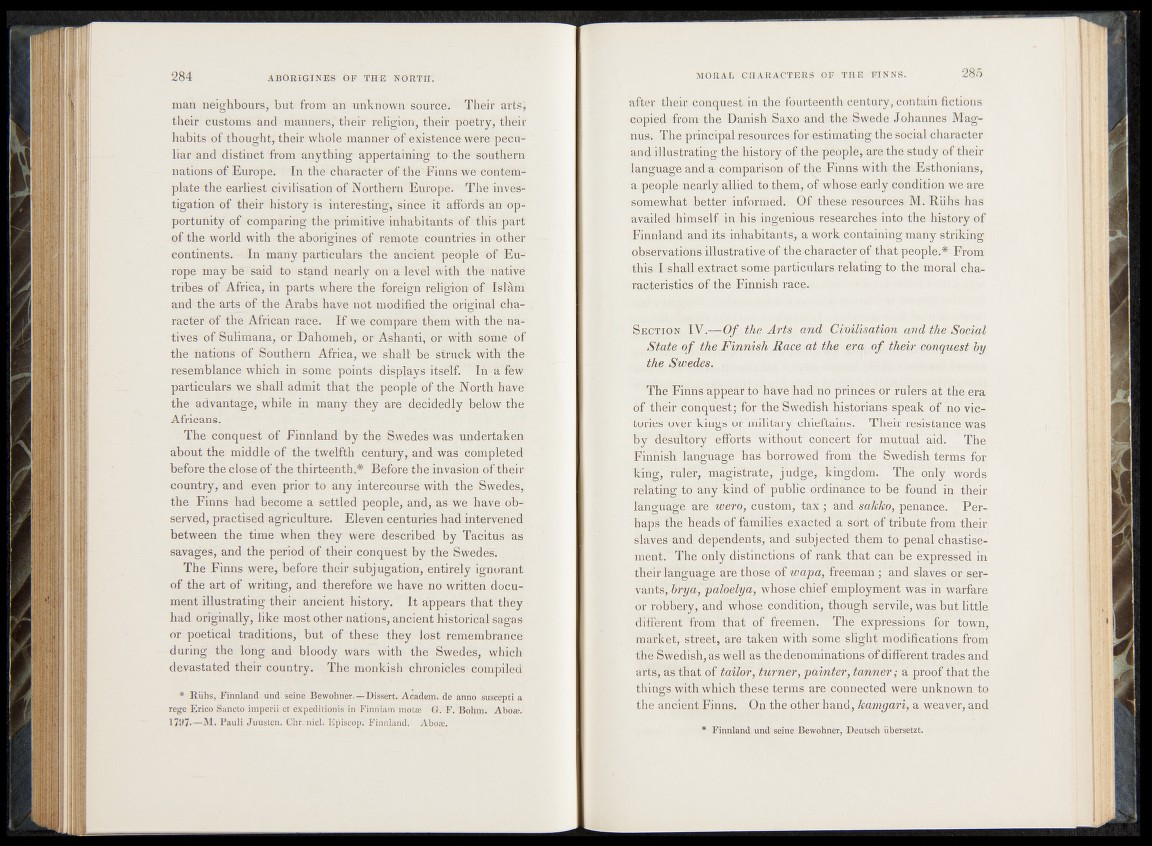
man neighbours, but from an unknown source. Their arts;
their customs and-manners, their religion-, their poetry, their
habits of thought, their whble manner of existence jvere*pecu-
liar and distinct from anything appertaining to the1 southern
nations of Europe. In the character of the~Finns we coritem-
plate 'the earliest civilisation o f Northern Europet The inVCs^
tigation of th e ir history interesting,^§jnce it”affords an>4>p-_
portunity of comparing the primitive inhabitants of> this part
of the world with the aborigines of remotet countries in Other
continents. In many particulars the ancient people -of Europe
may be; said to stand nearly on a'level with the'native
tribes of Africa, in parts where the foreign religiOn-bf • Isldm
artd the arts of the Arabs have not modified the original cha-
racter of the African race. If we compare them with t-he na-
tives of Suliihana, or Dahomeh, or Ashanti, or with somC^of
the nations of Southern Africa, we shall- be struck with* the
resemblance which in some points displays itself. Ih a^few
particulars we shall admit that the people *of the North bavlf
the advantage, while in many they are decided the
Africans.
'T h e conquest of Finnland by the Swedes was undertaken
about the middle of the twelfth century, and was completed?
before the close of the thirteenth.* Before tb e invasion of th e i if
country, and even prior to any intercourse with theJ&WfedSsj'
the Fiona had become a settled people, and, as we %aye- observed,
practised agriculture. Eleven centuries had intervened
between the time when they were described by Tacitus as
savages, and the perlod of their conquest by-the Swedes”. ,
The Finns were, before their subjugation, entirely ignorant
of the art of writing, and therefore we have no written document
illustrating their ancient-history. It appears that they
had originally, like most other nations, ancient historical sagas
or poetical traditions, but of these they lost remembrance
during the long and bloody wars with the Swedes, which
devastated their country. The monkish chronicles compiled
* Riihs, Finnland rind seine Bewohner.—Dissert. Acadenj, de anrib suscepti a
rege Erico Sancto imperii et expeditions in Finniam motas G. F. Bohm. Abo®.
1797-—M. Pauli Juristen. Chrjnicl. Episcop. Finnland. Abose.
ate» theitt conqpesf in the fourteenth century-, contain fictions
copied, from the DanisfeiSaxn©.*-and the ;S \yede Johannes Magnus.
The principal respmGes^feui istinxating the social character
andJilustratingi-the, histor.yriofi'the^eqple,areithe^study bf their
language- and ^pompaniso^i^the^Esinns with, the Esthonians,
a. pe,opl’eiT|ea£%.alliedfto,thoW5 of whos.e?early condition-weate
somewhat, betterrinfoTmed.s^JOf ifhesdi-rosources; M. Riihs has
availedihina^ulh in hisrin§enious->res^afcfli0^into the history of
Finnlalndiiand; its inhabitants* n work^ephtairi^gnaan-y striking
ohs'etyations illustfatiye‘of-thpjcharae,ter of»thatipeople.* From
thajS'l shall extract some particular Sv,tel?a ting t@fthfe*morM cha^
racteristics ofthaFinnish race.
S e c t io n IMèurPf- the, Arts antd Civilisation anß the Social
State o f the Finnish Race at the era o f their conquest by*
. the Swedes.
The,*Mnns^^^^rto hiwc had no prlnces.m nimfsSlf the,era
op riielrconqu^T;' lor Weil^lpnlm nistörians^speäToi no vic-
tbw^oWr 'K^ngs of^military chieftains. ‘ TFeir'res^ance’w,as
by*äesultor,3r ctforts witnbn^Concert' fortjnutual aid. The
rnmifs^UaiigufOT^has"1 bo^&Wea mom the Sweaï^terms, for*
kin^, ‘m|er, .’magistrate^ judge„ 'kingdom. Thé only -words,
f^l-titfg to an y% in ^ f|p ü b lic ordinahceTo bè' Jwnü.-in.'their
lähgiMge af é" werófcu atom, fax ; and saÄÄ;o,4'pen^toe." Perhaps
tlhe heads'óf famirii^^pStedra^SOTt óf tribute from their
slhves and ‘dependents, and s u p f i f f l p -fö^penal qbastise-
ment." The only mMïnctionè of rank that^^mTlg e ^ r ^ e d ,,in
their language are tnosefof wap a, freeman ; and sïavegóor servants,
hryal 'palöelya, whole* chi er employment w as. jri warfare
or robbery,” and whose conditiob, though sm vile, wa^bu t little
différent trom' m af 6f freeme ^ The^^ ^ ^ i l n s 1 Jor town,
market,'streét, are taken’w i t h ' módjïfcations from
the Swedish' äs well as the denominations of different trades and
arts, as that of tailor, turner, painter, earner; aTproof that the
things with which these terims are.'coniiec.ted-Jwerb unknown to
the anciqnt Fin us. On the other'baud, kamgari, a^iyeayer, and
* Finnland und seine Bewohner, Deutsch übersetzt.